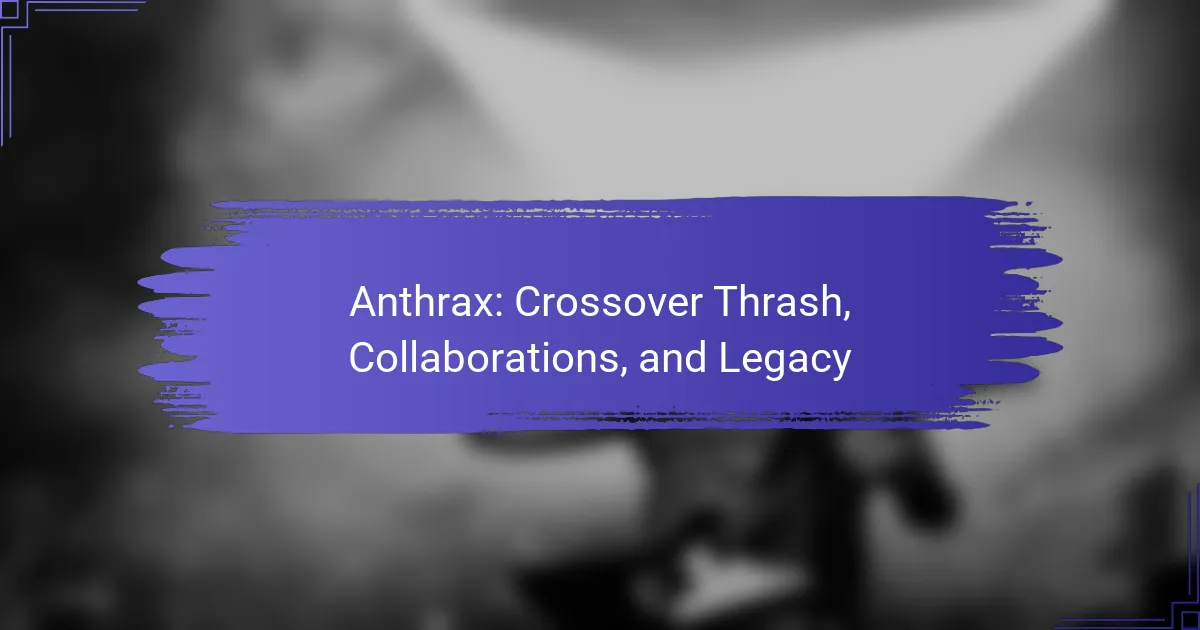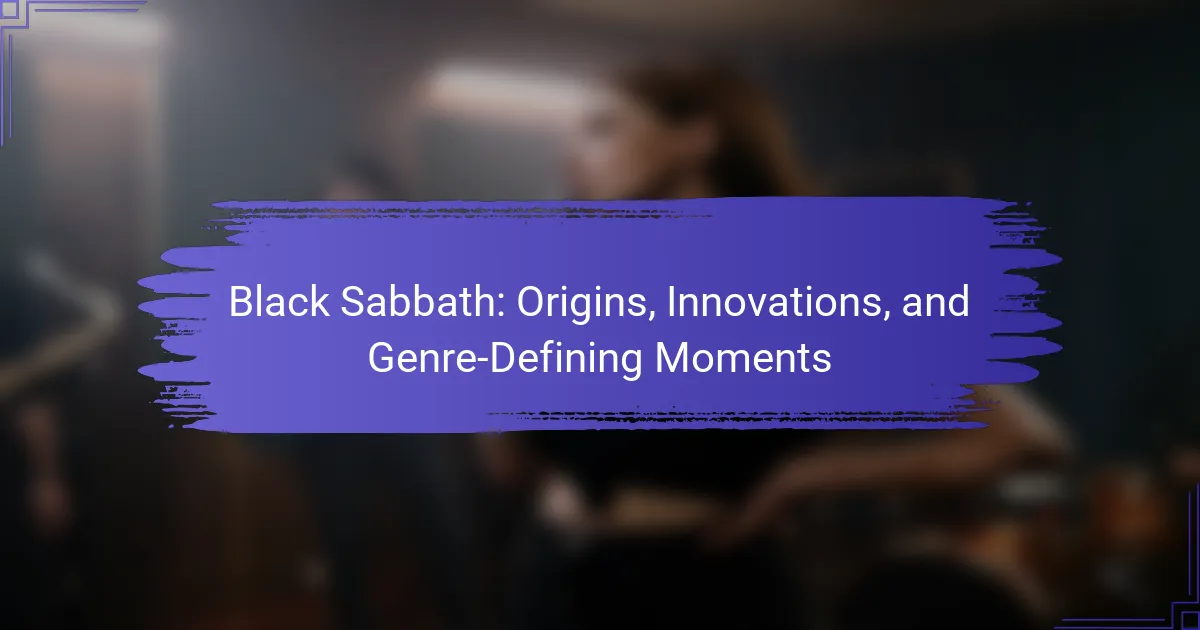Ozzy Osbourne’s solo career has left an indelible mark on heavy metal music. It began with the acclaimed album “Blizzard of Ozz,” showcasing his innovative sound. His influence reshaped the genre, introducing melodic elements and theatrical performances. Osbourne’s resilience in facing personal challenges further underscores his enduring legacy in popular culture.

What are the key milestones in Ozzy Osbourne’s solo career?
Ozzy Osbourne’s solo career features key milestones that shaped his influence and musical innovations. His debut album, “Blizzard of Ozz,” released in 1980, marked a significant start, introducing hits like “Crazy Train.” In 1981, he followed up with “Diary of a Madman,” solidifying his solo success. The 1982 album “Speak of the Devil” showcased live performances and included classic Black Sabbath songs. In 1991, “No More Tears” was released, featuring the hit “Mama, I’m Coming Home,” which became a defining track of his career. His 2001 album “Down to Earth” reflected his continued evolution in sound. In 2003, the reality show “The Osbournes” brought him mainstream recognition, further enhancing his cultural impact.
How did the release of “Blizzard of Ozz” shape his musical identity?
The release of “Blizzard of Ozz” solidified Ozzy Osbourne’s identity as a solo artist. This album introduced a distinct sound that blended heavy metal with melodic elements, showcasing his unique vocal style. It featured iconic tracks like “Crazy Train” and “Mr. Crowley,” which became defining moments in his career. The collaboration with guitarist Randy Rhoads added innovative guitar work, further shaping Osbourne’s musical direction. “Blizzard of Ozz” marked a transition from his Black Sabbath roots, establishing him as a pioneering figure in heavy metal music.
Which albums marked significant turning points in his career?
Ozzy Osbourne’s solo career saw significant turning points with key albums that transformed his musical trajectory. Notable albums include “Blizzard of Ozz,” which established his solo identity, and “No More Tears,” showcasing his songwriting depth. “Diary of a Madman” solidified his influence in heavy metal, while “Ozzmosis” marked his return to prominence in the 1990s. Each of these albums contributed uniquely to his legacy and musical innovations.
What collaborations have defined his solo work?
Ozzy Osbourne’s solo work has been significantly shaped by collaborations with notable artists. Key partnerships include his work with Randy Rhoads, whose guitar skills defined classic albums like “Blizzard of Ozz.” Additionally, collaborations with musicians such as Zakk Wylde and Geezer Butler enriched his sound and creative direction. These partnerships contributed to his unique blend of heavy metal and rock, establishing his influence in the music industry. Moreover, Osbourne’s collaboration with producer Bob Ezrin on “The Ultimate Sin” introduced innovative production techniques that further defined his solo career.

How has Ozzy Osbourne influenced the heavy metal genre?
Ozzy Osbourne has profoundly influenced the heavy metal genre through his distinctive vocal style, theatrical stage presence, and innovative musical approach. His solo career, following his time with Black Sabbath, introduced a more melodic and diverse sound, paving the way for future metal artists. Osbourne’s albums, such as “Blizzard of Ozz” and “Diary of a Madman,” showcased a blend of heavy riffs and intricate solos, setting a new standard for musicianship in metal. His collaborations with guitarists like Randy Rhoads introduced neoclassical elements, further expanding the genre’s boundaries. Osbourne’s persona and storytelling in lyrics have inspired countless artists, solidifying his legacy as a pivotal figure in heavy metal history.
What are the defining characteristics of his musical style?
Ozzy Osbourne’s musical style is defined by heavy metal elements, theatricality, and distinctive vocal delivery. His work often features dark themes and innovative guitar riffs. Unique attributes include his incorporation of diverse influences, blending rock, blues, and classical elements. Rarely, he experiments with orchestral arrangements, showcasing versatility in his solo career.
Which artists cite him as an influence?
Numerous artists cite Ozzy Osbourne as a significant influence, including Metallica, Guns N’ Roses, and Slipknot. His unique vocal style and innovative approach to heavy metal shaped the genre. For example, James Hetfield of Metallica has acknowledged Osbourne’s impact on his songwriting. Additionally, artists like Marilyn Manson and Avenged Sevenfold have expressed admiration for his work, emphasizing his role in defining the sound of rock and metal. Ozzy’s influence spans generations, making him a pivotal figure in music history.
How has his persona contributed to his legacy?
Ozzy Osbourne’s persona has significantly shaped his legacy through his distinctive style and rebellious image. His theatrical performances and bold personality have influenced generations of musicians. Osbourne’s unique blend of heavy metal and rock has redefined genres, while his candidness about personal struggles has resonated with fans. This authenticity has solidified his status as a cultural icon. His contributions extend beyond music, impacting fashion and pop culture, making him a lasting figure in entertainment history.

What innovations has Ozzy Osbourne brought to music production?
Ozzy Osbourne has revolutionized music production through innovative vocal techniques and genre-blending. His use of layered harmonies and effects, particularly in albums like “Blizzard of Ozz,” set new standards. Osbourne’s incorporation of theatrical elements and storytelling in his music has influenced countless artists. Additionally, he popularized the use of digital recording technologies, enhancing sound quality and production efficiency.
Which techniques did he pioneer in his recordings?
Ozzy Osbourne pioneered several innovative recording techniques in his solo career. He utilized multi-track recording to layer vocals and instruments, enhancing sound depth. His collaboration with producers like Bob Ezrin introduced orchestral elements and complex arrangements. Additionally, Osbourne’s use of digital effects shaped his signature sound, blending heavy metal with unique sonic textures.
How has technology impacted his music over the years?
Technology has significantly transformed Ozzy Osbourne’s music by enhancing production quality and expanding creative possibilities. Innovations like digital recording and synthesizers have allowed for richer soundscapes and intricate compositions. For instance, the use of Auto-Tune has enabled more precise vocal performances. Additionally, the rise of social media has facilitated direct artist-audience engagement, altering how music is marketed and consumed. This evolution reflects a blend of traditional rock elements with modern technological advancements, keeping his music relevant across generations.

What are the cultural impacts of Ozzy Osbourne’s public persona?
Ozzy Osbourne’s public persona significantly influences culture by challenging norms and shaping music genres. His theatrical style and rebellious attitude have redefined rock music and inspired countless artists. Osbourne’s unique blend of horror and humor creates a distinctive brand that resonates with fans. As a result, he has become an iconic figure in popular culture, embodying the spirit of individuality and creativity.
How has his image influenced popular culture?
Ozzy Osbourne’s image has significantly influenced popular culture through his distinct persona and musical innovations. His theatrical performances and unique style have shaped the heavy metal genre, inspiring countless artists. Osbourne’s embrace of the darker elements of rock has led to a cultural fascination with the macabre, evident in fashion, film, and television. Additionally, his reality show, “The Osbournes,” brought his family dynamics into the spotlight, further cementing his cultural relevance. His ability to blend music with a larger-than-life persona continues to resonate across various media, influencing both fans and fellow musicians.
What role has television played in shaping his public perception?
Television has significantly shaped Ozzy Osbourne’s public perception by showcasing his unique personality and musical talent. His reality show, “The Osbournes,” humanized him, revealing a relatable family man. This portrayal contrasted with his heavy metal image, broadening his appeal. Additionally, televised performances and interviews highlighted his musical innovations, influencing both fans and aspiring artists.

Which themes are prevalent in Ozzy Osbourne’s lyrics?
Ozzy Osbourne’s lyrics often explore themes of personal struggle, existential angst, and the darker aspects of human nature. Common motifs include mental health, addiction, and mortality. His unique storytelling approach combines fantasy elements with raw emotional honesty, reflecting his own life experiences. Additionally, themes of rebellion and societal critique frequently appear, showcasing his influence on rock music and culture.
How do his personal experiences reflect in his songwriting?
Ozzy Osbourne’s personal experiences deeply influence his songwriting, often reflecting themes of struggle and resilience. His battles with addiction and mental health inform lyrics that resonate with many fans. For instance, songs like “Crazy Train” explore the chaos of his life, while “Mama, I’m Coming Home” conveys longing and vulnerability. These authentic narratives create a strong emotional connection, showcasing his unique ability to transform personal pain into universal themes.
What recurring motifs can be found in his discography?
Recurring motifs in Ozzy Osbourne’s discography include themes of isolation, existential struggle, and the supernatural. His lyrics often explore personal demons and mental health, reflecting his unique experiences. Additionally, he frequently incorporates dark imagery and references to mythology, enhancing the theatrical aspect of his music. These motifs contribute to his distinctive sound and influence across genres.

How has Ozzy Osbourne’s music evolved over the decades?
Ozzy Osbourne’s music has evolved significantly, showcasing diverse styles and influences over the decades. Initially rooted in heavy metal, his solo career began with the iconic album “Blizzard of Ozz” in 1980, which introduced a blend of hard rock and melodic elements.
In the 1980s, Osbourne embraced a more theatrical approach, incorporating synthesizers and diverse musical influences, evident in albums like “The Ultimate Sin.” The 1990s saw a return to his heavy metal roots, with “No More Tears” highlighting lyrical depth and complex arrangements.
As the new millennium approached, Osbourne experimented further, collaborating with various artists and integrating modern production techniques. His 2001 album “Down to Earth” featured a more contemporary sound while maintaining his signature style.
Throughout his career, Osbourne’s unique attributes include his distinctive vocal style and the ability to adapt to changing musical landscapes, ensuring his relevance across generations. His influence on rock music remains profound, inspiring countless artists while continuously evolving his sound.
What are the notable changes in his sound from the 1980s to 2025?
Ozzy Osbourne’s sound evolved significantly from the 1980s to 2025, reflecting changes in musical style and production techniques. In the 1980s, his music featured heavy metal roots with a focus on guitar-driven riffs and theatrical vocals. By 2025, his sound incorporated modern elements such as electronic influences and diverse genres, showcasing a unique blend that highlights his adaptability. This evolution illustrates his ability to remain relevant while maintaining his signature style.
Which contemporary artists have influenced his recent work?
Contemporary artists influencing Ozzy Osbourne’s recent work include Post Malone, Travis Scott, and Billie Eilish. Their diverse styles have inspired his musical innovations, blending rock with modern genres. Collaborations with these artists have introduced fresh elements to his sound, showcasing his adaptability. This fusion highlights Osbourne’s ability to evolve while maintaining his iconic identity.

What challenges has Ozzy Osbourne faced throughout his career?
Ozzy Osbourne has faced numerous challenges throughout his career, including substance abuse, health issues, and public scrutiny. His struggles with addiction have led to multiple rehab stints, impacting his personal and professional life. In addition, he has dealt with serious health problems, including a near-fatal accident in 2003 and Parkinson’s disease diagnosis in 2020. Public controversies, such as the infamous biting of a bat on stage, have also shaped his legacy. Despite these obstacles, Osbourne’s resilience and musical innovation have solidified his influence in rock music.
How have health issues impacted his music and performances?
Health issues have significantly affected Ozzy Osbourne’s music and performances. His struggles with Parkinson’s disease have led to changes in his stage presence and vocal delivery.
Osbourne’s health challenges have prompted him to adapt his performances, often relying on backing tracks to support his vocals. This adjustment allows him to maintain his energy while coping with physical limitations.
Additionally, his health issues have influenced his songwriting, with themes of resilience and struggle becoming more prominent in his later work. Fans appreciate the raw honesty in his music, reflecting his personal battles.
Overall, these health challenges have not diminished his impact but have instead added depth to his artistry, demonstrating his enduring influence in rock music.
What controversies have surrounded him, and how have they affected his career?
Ozzy Osbourne has faced numerous controversies, significantly impacting his career. Issues such as substance abuse, public outbursts, and legal troubles have shaped his public image. These controversies often overshadow his musical achievements but have also contributed to his notoriety and influence in rock music. For instance, his infamous biting of a bat during a performance led to widespread media coverage, enhancing his rebellious persona. Despite these challenges, Osbourne’s resilience and ability to reinvent himself have allowed him to maintain a successful solo career.

How does Ozzy Osbourne maintain relevance in today’s music industry?
Ozzy Osbourne maintains relevance in today’s music industry through continual innovation and collaborations. He adapts to modern trends while preserving his iconic sound. His influence spans generations, inspiring new artists and engaging with fans via social media. Osbourne’s recent albums showcase his ability to blend classic rock with contemporary styles, keeping his music fresh and appealing.
What strategies does he use to connect with new audiences?
Ozzy Osbourne connects with new audiences through innovative collaborations and diverse musical styles. He frequently collaborates with contemporary artists, bridging generational gaps. His use of social media platforms enhances direct engagement, allowing him to reach younger fans effectively. Additionally, Osbourne’s willingness to experiment with genres, such as pop and electronic music, broadens his appeal. These strategies ensure his relevance in an evolving music landscape.
How does he leverage social media for engagement?
Ozzy Osbourne leverages social media to engage fans by sharing personal updates, music releases, and behind-the-scenes content. His interactive posts and live sessions foster a sense of community. Engaging with fan comments enhances loyalty and connection. Additionally, collaborations with other artists amplify his reach across platforms.
What lessons can emerging artists learn from his career?
Emerging artists can learn resilience, innovation, and the importance of personal branding from Ozzy Osbourne’s career. His ability to reinvent himself and adapt to changing musical landscapes demonstrates the value of versatility. Osbourne’s strong connection with fans highlights the significance of authenticity. Additionally, his willingness to experiment with different musical styles encourages artists to explore their creativity without fear.


